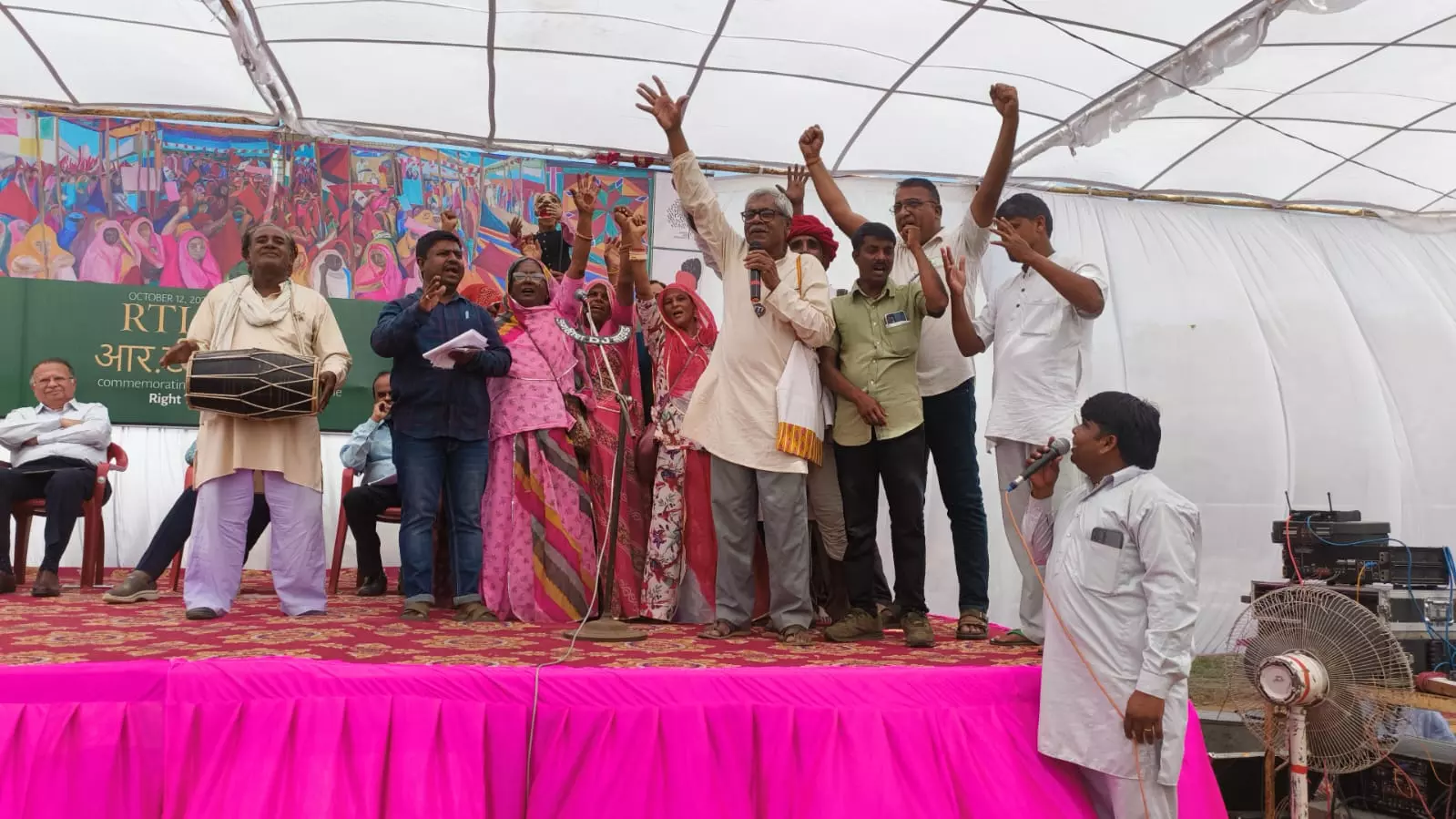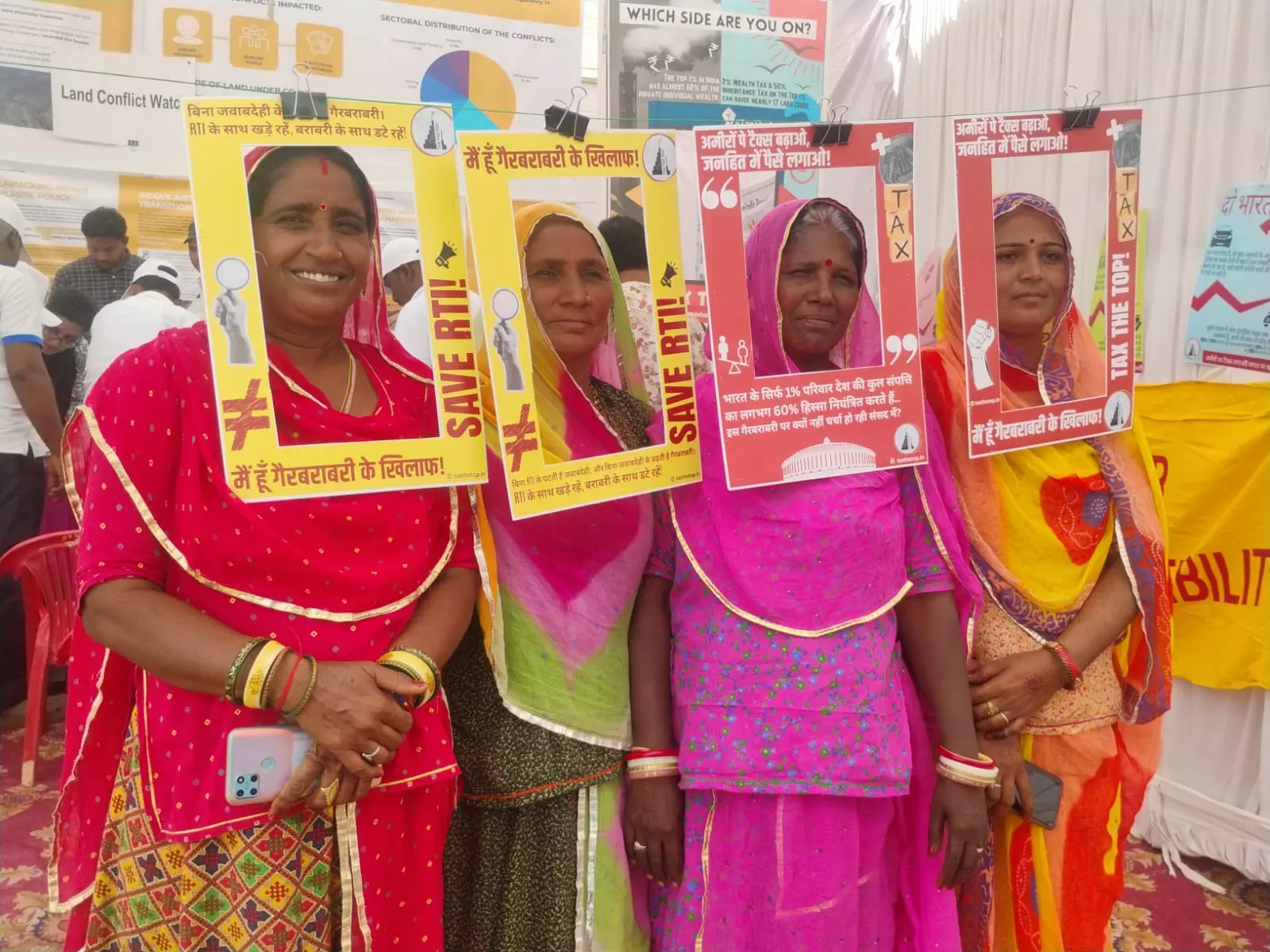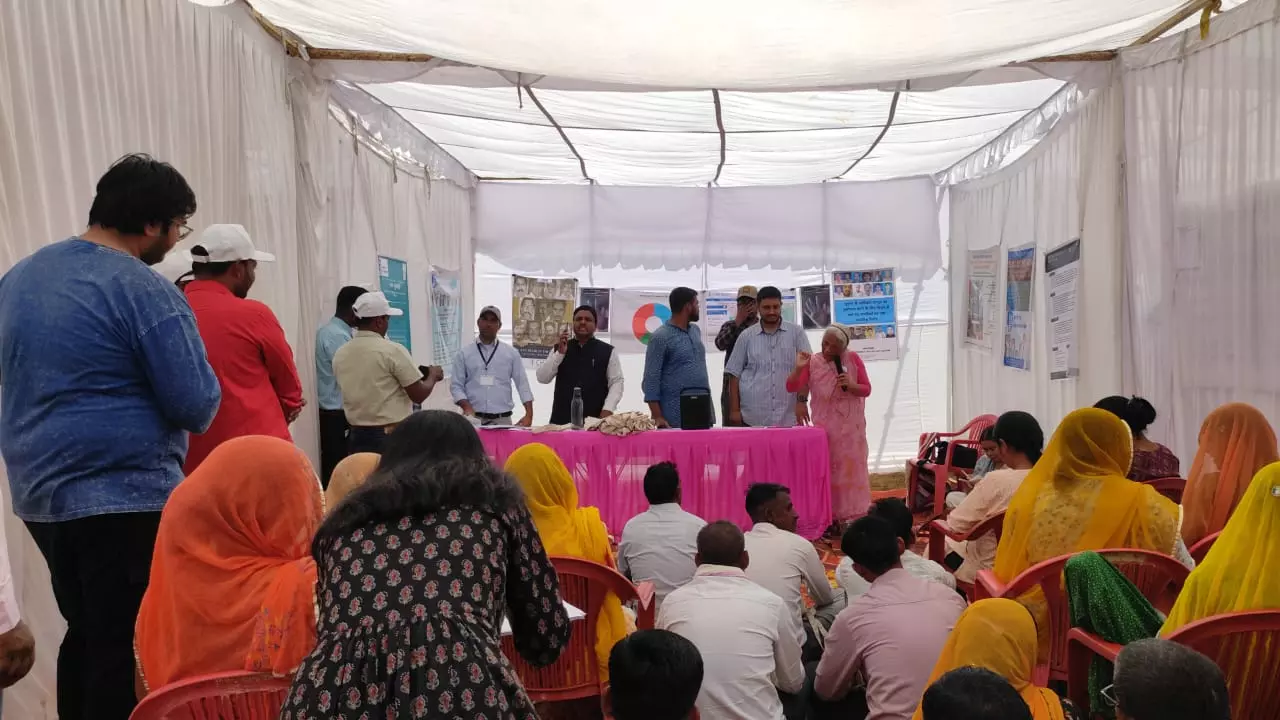
- Home
- India
- World
- Premium
- THE FEDERAL SPECIAL
- Analysis
- States
- Perspective
- Videos
- Sports
- Education
- Entertainment
- Elections
- Features
- Health
- Business
- Series
- In memoriam: Sheikh Mujibur Rahman
- Bishnoi's Men
- NEET TANGLE
- Economy Series
- Earth Day
- Kashmir’s Frozen Turbulence
- India@75
- The legend of Ramjanmabhoomi
- Liberalisation@30
- How to tame a dragon
- Celebrating biodiversity
- Farm Matters
- 50 days of solitude
- Bringing Migrants Home
- Budget 2020
- Jharkhand Votes
- The Federal Investigates
- The Federal Impact
- Vanishing Sand
- Gandhi @ 150
- Andhra Today
- Field report
- Operation Gulmarg
- Pandemic @1 Mn in India
- The Federal Year-End
- The Zero Year
- Science
- Brand studio
- Newsletter
- Elections 2024
- Events
20 years of the RTI law: How a marquee legislation has been weakened and diluted
Already battling vacancies at information commissions and pendency of appeals, the RTI law was dealt a severe blow by the Digital Personal Data Protection Act, 2023, which amended the definition of 'personal information' in the RTI Act and restricted its disclosure, say activists.

In 2018, Yugantar, a 44-year-old not-for-profit organisation in Telangana, launched a portal to help people file online RTI (right to information) applications free of cost. Titled Yourti.in, the portal has filed over 13,500 applications on behalf of others since and received 26,300 plus responses, says Kareem Ansari, a social and civil rights activist based in Hyderabad, working with...
In 2018, Yugantar, a 44-year-old not-for-profit organisation in Telangana, launched a portal to help people file online RTI (right to information) applications free of cost. Titled Yourti.in, the portal has filed over 13,500 applications on behalf of others since and received 26,300 plus responses, says Kareem Ansari, a social and civil rights activist based in Hyderabad, working with Yugantar. “Ninety-eight per cent of the RTI applications filed by us are in the domain of public works. The RTIs are filed by Yourti.in, so the original applicant can remain anonymous if they want. The filing fees are also paid by us. Responses are uploaded on the portal,” explained Ansari.
Of late, however, the activist says he has noticed a persistent delay in receiving responses; the law mandates responses be given to RTIs within 30 days. If the department that has received the application feels it necessary to transfer the plea to another department, the other department will have 30 days from the date of receipt to respond. If a response is not received or if the response is found to be unsatisfactory, applicants may raise up to two appeals — the first within the public authority to a designated officer senior to the public information officer and the second at information commissions (set up at central and state levels). If still dissatisfied, the applicant may move high courts under Article 226 of the Constitution.
“What we have been seeing is that one department keeps the plea with it for 20-25 days, then transfers it to another, which again keeps it for a period before transferring it again. This has been happening for the past four years,” says Ansari, calling it “a weakening” of the RTI mechanism.
The Right to Information (RTI), Act, passed by the Parliament in 2005, came into effect on October 12 that year, completing 20 years earlier this month. “In the past 20 years, the RTI Act has vindicated its necessity by empowering people to seek information to make governments accountable. But it has also activated resistance from people with vested interest who do not want transparency, very powerful people within or without the system who feel threatened by the RTI because it is tool to dismantle power,” said Aruna Roy, activist and founder member of the Mazdoor Kisan Shakti Sangathan (MKSS), a collective that had been at the forefront of the movement which had culminated in the formulation of the RTI Act.
And yet, at the beginning, the movement had not been for RTI, but a demand for land and minimum wages, recalled Nikhil Dey, activist and another of the MKSS founders.
It all began in Rajasthan, where the MKSS was founded. Starting in 1994, the MKSS held a series of ‘Jan Sunwais’ or public hearings to highlight “issues of corruption and arbitrary use of power”. In the book, The RTI Story: Power To The People, Roy writes, “With the findings from these five public hearings between December 1994 and the end of April 1995, it became increasingly clear that the disclosure of information and access to government records were absolutely necessary for realising democratic rights”.

Participants at the RTI Mela in Beawar. Photo by special arrangement
In 1996, MKSS staged a 40-day-long dharna at Chang Gate in Beawar, Rajasthan, demanding the right to information and accountability in governance. “The dharna became a hub where journalists, intellectuals and activists all came to write, sing and speak to strengthen the movement… The news spread to other parts of India and captured the imagination of some eminent people”, putting the right to information movement on the national map.
“In the past 20 years the RTI has been used extensively by people to seek accountability in a variety of cases, from issues like electoral bonds to allotment of work and payments made under MGNREGA, to question crony capitalism and reveal institutionalised corruption in awarding of contracts and loans and to uphold human rights, dalit rights, rights of adivasis and women, whenever FIRs have not been filed in cases of abuse or investigation has been found to be languishing,” said Dey.
There is scant evidence that the enthusiasm to use the law has dipped in 20 years, says Venkatesh Nayak, director, Commonwealth Human Rights Initiative (CHRI, India). According to reports, an estimated four to six lakh RTI applications are filed across the country annually.
The challenge, according to Nayak and other activists like him, is the systematic efforts being made to dilute and weaken the law.
Also read: Despite laws, why inheriting parental property remains a challenge for women
Such efforts are not new. In The RTI Story, Roy writes “within ten months of its passage, the government developed cold feet”, seeking to amend the law “to prevent disclosure of the process of decision-making”. But the proposed amendments were withdrawn following public outcry.
Speaking to The Federal, Roy said, “In the past, whenever there have been efforts to weaken the law, to amend it, people have come out in droves to protest and push back. But this government [referring to the current NDA government at the Centre], since coming to power, has realised it can restrict the use of the RTI and weaken it through the passage of other laws which override the RTI.”
The most recent, and critical of these, say activists, is the Digital Personal Data Protection (DPDP) Act, 2023. In January this year, the Ministry of Electronics and Information Technology (MeitY) reportedly drafted rules to facilitate its implementation, but the rules are yet to be notified. Section 2 (T) of the DPDP defines personal data as “any data about an individual who is identifiable by or in relation to such data”. “This provision can be used to deny any information,” said Roy.

Participants at the RTI Mela. Photo by special arrangement
Section 44 (3) of the DPDP Act goes on to amend Section 8 (1) (J) of the RTI Act which had safeguarded the disclosure of ‘information which relates to personal information the disclosure of which has no relationship to any public activity or interest, or which would cause unwarranted invasion of the privacy of the individual unless the Central Public Information Officer or the State Public Information Officer or the appellate authority, as the case may be, is satisfied that the larger public interest justifies the disclosure of such information’. It added: “Provided that the information which cannot be denied to the Parliament or a State Legislature shall not be denied to any person”. Section 44 (3) of the DPDP Act, however, removes all such provisos of Section 8 (1) (J), stating “In section 8 of the Right to Information Act, 2005, in sub-section (1), for clause (j), the following clause shall be substituted, namely:— ‘(j) information which relates to personal information’,”.
“The RTI is a tool to identify corruption and arbitrary use of power, but how can anything be identified if we can’t get a name because it is personal information,” questioned Dey.
In an open letter to attorney general R. Venkataramani earlier this year, Justice Ajit Prakash Shah, a former Delhi high court chief justice and former chairperson of the Law Commission of India, expressed concern over the changes to the RTI law through the DPDP Act. “These changes represent a seismic shift in India’s transparency framework for the worse, threatening to dismantle RTI Act’s core purpose of democratic accountability and citizen empowerment,” he wrote. Justice Shah added: As a co-author of the Report of the Group of Experts on Privacy (2012), constituted under the aegis of erstwhile Planning Commission, it was our position that any legislation on privacy should not affect or dilute the RTI Act. Our report recommended that ‘Privacy Act should not circumscribe the Right to Information Act.’ It also unequivocally stated that ‘Any information that is available or accessible in public domain or furnished under the Right to Information Act, 2005 will not be regarded as sensitive personal data.’ This foundational principle, articulated in greater detail in our report, demonstrates the complementary nature of privacy and transparency – which the DPDP Act gravely disrupts.”
Indeed, despite rules yet to be notified, Nayak says they have already seen instances of the DPDP Act being cited to deny information sought by RTI applicants. National Campaign for People's Right to Information (NCPRI) co-convenor, Pankti Jog, cites an example of a case received on their helpline. “An applicant had asked for information about how many companies in the two Gujarat districts of Botad and Amreli had sought permission to allow women to work in night shifts; how many had received permission and how many were denied; whether any other special permission was sought for this; and to provide all labour department circulars issued on the subject in the past 10 years. The information was denied in August, citing the Digital Personal Data Protection Act. We had received another such case three months back of RTI information being denied under the DPDP Act,” she said.
There are other challenges. Since 2018, Anjali Bhardwaj, activist, NCPRI co-convenor and founding member of the Satark Nagrik Sangathan (SNS), her SNS colleague Amrita Jori and activist, Commodore Lokesh Batra, have been petitioners in a case in the Supreme Court on the non-appointment of chief information commissioners and other information commissioners at the Central and state levels. “Since 2014, till we moved the Supreme Court in 2018, not a single appointment had taken place. After that, appointments were made, but every time one of the commissioners or a chief commissioner retires, fresh appointments are not made till the Supreme Court issues a directive. Which is why the court has kept the case open,” explained Bhardwaj.
According to a ‘Report Card on the Performance of Information Commissions in India, 2024-25’, released by SNS earlier this month, “Six information commissions were defunct for varying periods of time between July 1, 2024, to October 7, 2025, as no new commissioners were appointed upon the incumbents demitting office. Of these, two commissions — Jharkhand and Himachal Pradesh — continue to be defunct as of October 7, 2025. Three commissions are currently functioning without a chief information commissioner” and “several information commissions were found to be functioning at reduced capacity”. The report also found “2,41,751 appeals and complaints were registered between July 1, 2024, and June 30, 2025, by 27 information commissions for which relevant information was available. During the same time period, 1,82,165 cases were disposed of by these 27 commissions. 4,13,972 appeals and complaints were pending on June 30, 2025, in the 29 information commissions [across the country]”.
“In the initial years after the law was passed, departments would take the RTI very seriously. But now pendency has increased and since penalty is rarely imposed, there is no pressure on departments to respond,” rued Commodore Batra.
According to the SNS report, “Several ICs [information commissions] were found to be returning a very large number of cases without passing any orders. The CIC [chief information commission] returned 38 per cent of the appeals/complaints it received. The analysis of penalties imposed by information commissions shows that the commissions did not impose penalties in 98 per cent of the cases where penalties were potentially imposable”.

The Whistle Blowers stall at the RTI Mela. Photo by special arrangement
In addition to the vacancies, there have been other ways in which the information commissions have been weakened, which directly impacts the strength of the RTI law itself, says Bhardwaj.
“In recent years, the RTI rules have been amended with changes impacting the autonomy of the information commissions. Under the new rules, the tenure of the chief information commissioner and information commissioners was reduced from five to three years. The salaries of the commissioners were also modified. This has increasingly brought the commissions under the control of the government and commissioners fear if they give any decision against the government, it may adversely impact them,” Bhardway alleged.
Activists and RTI users themselves often work under threatening conditions. According to Nayak, over 100 activists have lost their lives in the two decades since the law was brought in. There are also reports of activists being threatened, kidnapped, or beaten up. The CHRI on its portal has a live map of attacks on RTI users.
Jaisalmer-based school teacher and RTI user Babu Ram remembers being kidnapped and beaten up in 2015, while fighting for information regarding the allotment of government land to the landless in his village. “A few big landholders were controlling the government land, claiming it was their ancestral property. When my RTI applications started revealing the graft, they kidnapped and beat me up, shaved off part of my hair. I had fractures, was in hospital for 15 days and in bed for 110 days. Based on my complaint, a chargesheet was filed against six people, trial is on in the case,” he claimed.
According to Commodore Batra, the RTI is a “tool to participate in governance”. “Many people call it a weapon. I say, don’t call it a weapon, don’t create a division,” he added.
For it to continue to serve its purpose, however, governments have to be invested in spreading information, says Nayak. “Governments at the Centre and states have to clearly state that RTI is a democratic tool and we are using it. At present, they are determining transparency on a ‘need to know basis’. Guidelines have to be issued to implement the law, proactive disclosure has to be encouraged, all the information commissions lying defunct and vacancies in the functional commissions have to be filled and champions of transparency should be appointed as information commissioners. Pendency of cases has to be reduced and where needed, penalties have to be imposed,” he added.
On October 12, MKSS organised an RTI Mela to celebrate 20 years of the law. An RTI museum at Chang Gate in Beawar is also in the works. In her book, Roy writes, “The evolution of the National Right to Information Law (2005) is a story of the Indian democracy and a celebration of its people, who understood and struggled to make constitutional principles come alive in practice.”
Keeping it alive will require equal public commitment and vigilance.
